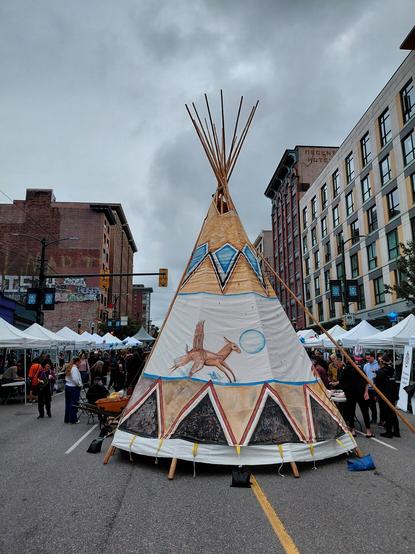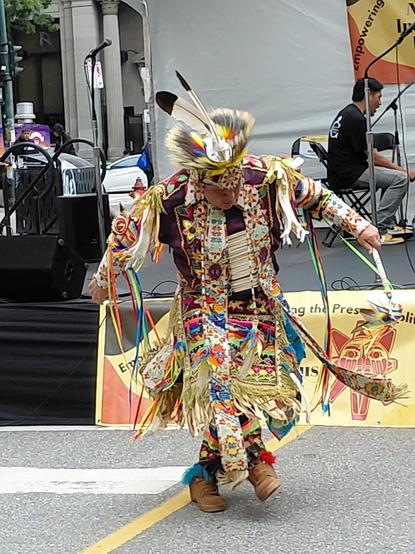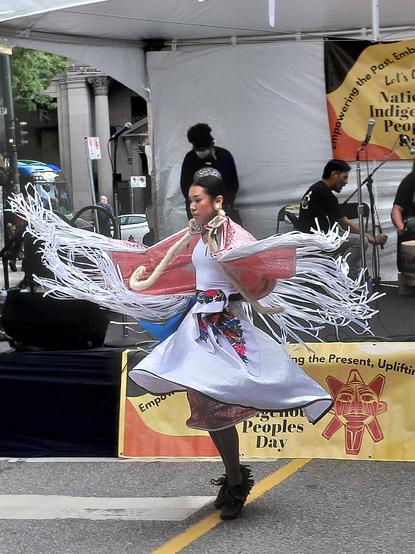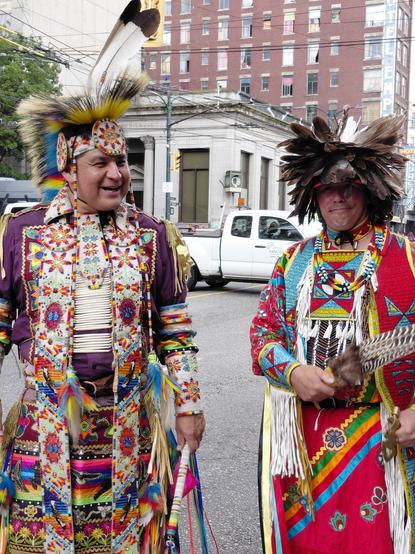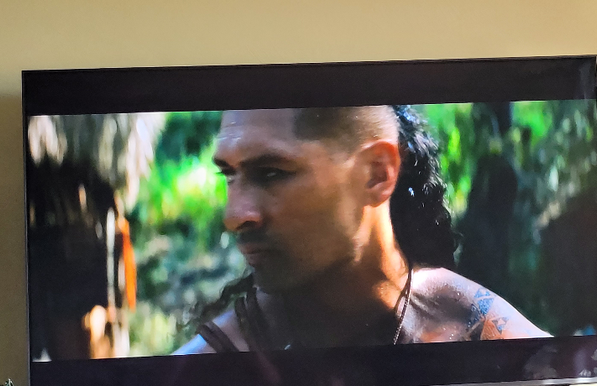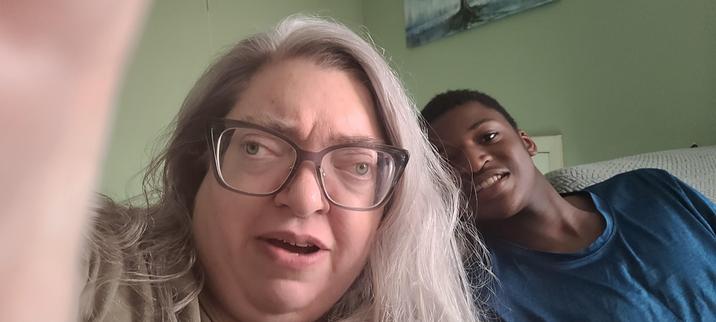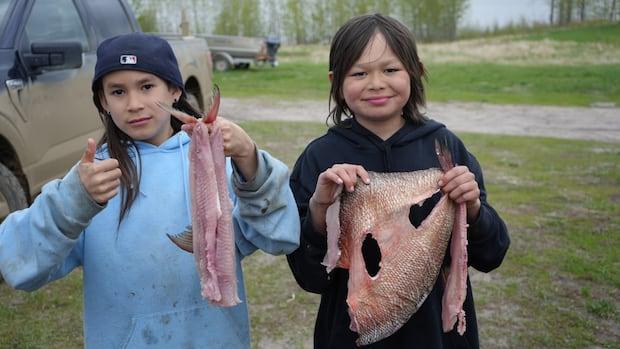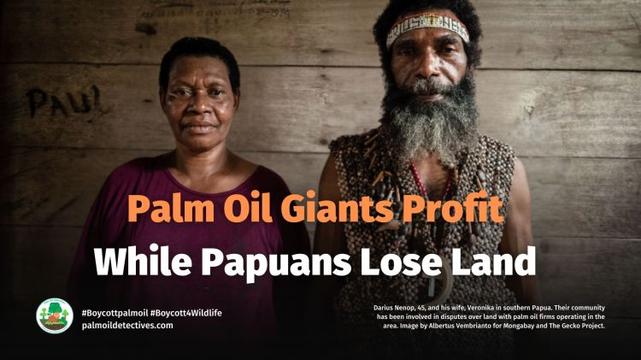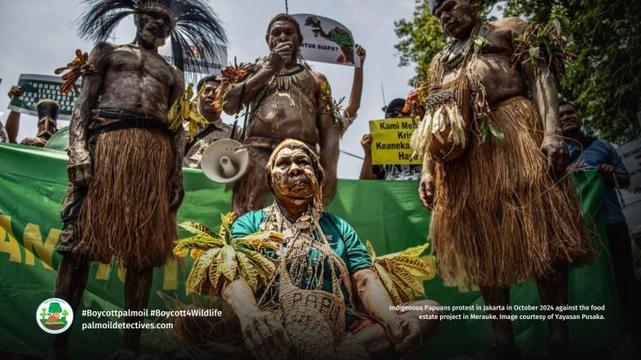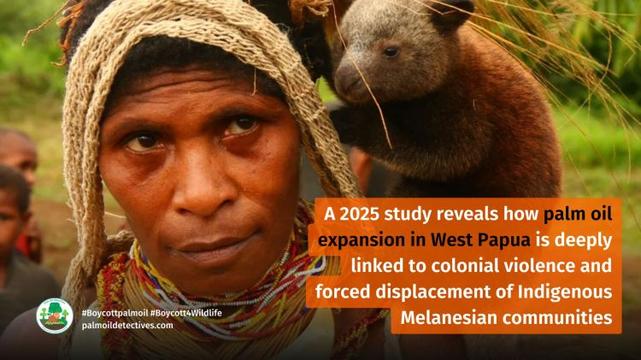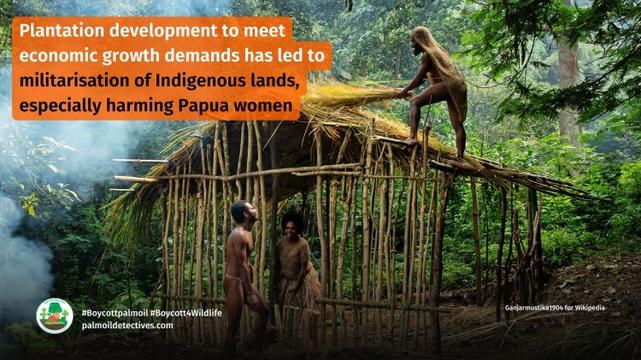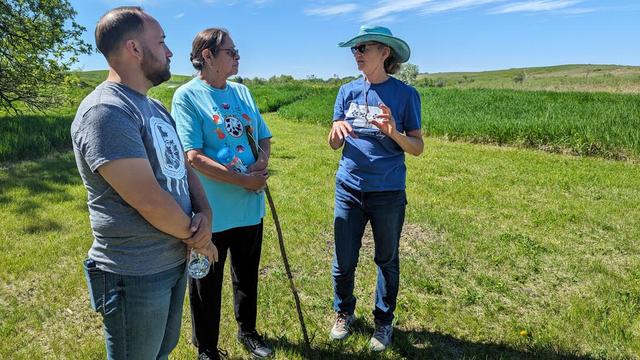‘Big, beautiful bill’ could deal an ugly blow for Missing and Murdered Indigenous People efforts - ICT News
#INDIGENOUS
Indigenous People's Day Gathering
Vancouver, B.C Canada
8:08pm Rest of My Days by Indigenous from Circle
#KJAC #TheColoradoSound #Indigenous
2/
And that time a long time ago is just for white people. For #BIPOC and marginalized people, the law, the courts, congress etc. has never meant anything EVER.
#Native #Indigenous #LGBTQ
Screening #ChiefOfWar the new series about #Hawaii through #Indigenous views. It is amazing. My nephew, 13, is helping. #blogger #histories #BIPOC
😀 Southern Ute tribal member elected to chair Colorado water policy board in historic first
The 15 members of the Colorado Water Conservation Board elected Lorelei Cloud as the board’s first-ever Indigenous chairperson
https://coloradosun.com/2025/05/28/southern-ute-tribal-leader-colorado-water-board-historic-first/
Many Navajo are finding the church play disturbing, which I can understand why. I think the church should make a point to not be outwardly offensive, as this play may likely have been, but Christianity has enough within it to offend anyone, Christians included, and especially those of other religions. https://indianz.com/News/2025/06/20/arizona-mirror-navajo-citizen-leads-protest-against-churchs-depiction-of-tribal-culture/ #indigenous #christianity
Help multiply marginalized disabled #Indigenous Latina #Immigrant family survive homelessness & lifelong #poverty URGENT: HOTEL PAST DUE $621 Ko-fi.com/SabiLewSounds PayPal.me/SabiLewSounds Cash.app/toadlyturtle Venmo.com/toadlyturtle (Note: Sabi) #BIPOCMA #HelpFolksLive2025 #MutualAid
This Inuit drumming group keeps the beat — and tradition — alive
From pioneers to new members, Kilautiup Songuninga share a love of music, Inuit culture and connection. The CBC’s Ella Burke and Mark Cumby spoke to some members of the group in Bannerman Park in St. John’s.
Short video
in her grace and her honesty; in her growth and her death.
sketched on procreate, ipad.
Kana’tsio:wi
The heartbeat of Haudenosaunee music
Water Drum and Why It's Important
#Haudenosaunee #Indigenous #NIPD #NIPM
#Music
https://www.cbc.ca/newsinteractives/features/the-heartbeat-of-haudenosaunee-music/
How Indigenous musicians give back to community
For these Indigenous artists, music is a way to be visible, speak out, promote language and identity and encourage the next generation.
#music #community #indigenous #News
https://www.cbc.ca/news/indigenous/indigenous-music-community-1.7557075?cmp=rss
Major Improvements to Bill C-5 https://www.youtube.com/watch?v=rVkxPDCixdQ
#NationalIndigenousPeoplesDay #BillC5 #indigenous #native #Canada #CanPoli #CDNpoli
Clearwater River Dene students learn language and cultural skills on the land
Three years ago Clearwater River Dene Nation School decided to include land-based learning in the classroom, where students go out on the lands to learn about fishing, trapping, etc. The program hopes to get more...
#education #culture #language #ClearwaterRiverDeneNation #News #Indigenous
https://www.cbc.ca/news/indigenous/clearwater-river-dene-students-learn-language-and-cultural-skills-on-the-land-1.7565778?cmp=rss
Palestinians forced to choose between being killed or starved, UN says
I am loving this book. It's ostensibly about #indigenous science #pollution #plastic and #colonialism but it's also about extractive reading and nuance in all things. It's fantastic, and I recommend it to everyone. #PollutionIsColonialism #bookstodon https://www.dukeupress.edu/pollution-is-colonialism
Greasing the Wheels of Colonialism: Palm Oil Industry in West Papua
A landmark study published in Global Studies Quarterly in April 2025 has revealed that the rapid expansion of the #palmoil industry in #WestPapua is not only fuelling #deforestation, #ecocide and environmental destruction but also perpetuating colonial-era patterns of land dispossession, #violence, and erasure of #Indigenous #Papuan communities #BoycottPalmOil
#Study finds #palmoil expansion in #WestPapua isn’t just fuelling #deforestation but also colonialist-style #landgrabbing #violence and systematic erasure of #Indigenous #Melanesian cultures and languages. #Boycottpalmoil 🌴🪔☠️🩸🚜🔥🧐⛔️ @palmoildetect https://palmoildetectives.com/2025/06/22/greasing-the-wheels-of-colonialism-palm-oil-industry-in-west-papua/
Share to BlueSky Share to TwitterResearchers Szilvia Csevár and Yasmine Rugarli found that Indonesia’s government has shifted its palm oil plantation focus from Sumatra and Borneo to West Papua, granting private companies nearly unlimited concessions over millions of hectares—including protected forests and Indigenous lands. “Oil palm plantations and associated infrastructure in West Papua have proliferated on a massive scale,” the authors report, noting that this expansion is driven by global demand and a system ‘rigged’ by corruption and profit motives, with little regard for the rights of indigenous peoples and their sovreignty.
The study highlights that large companies overwhelmingly rely on monoculture and invasive agricultural methods, despite evidence that intercropping and smallholder farming could minimise environmental harm. “Profit-driven large companies remain reluctant to adopt these practices; a disturbing status quo resulting from a rigged system of corruption in Indonesia,” Csevár and Rugarli write.
The findings echo long-standing warnings from West Papuan leaders and human rights advocates. Douglas Gerrard, writing for the Office of Benny Wenda, describes how “the most critical years of West Papuan history are told entirely from the colonisers’ perspective,” contributing to a process of historical erasure that keeps Indonesia’s occupation and its consequences out of international view. Gerrard urges the world to “put West Papua back into history”—a call that resonates with the study’s documentation of ongoing land theft and displacement.
Human rights groups and scholars have repeatedly accused the Indonesian state of using military force to suppress Papuan self-determination and facilitate resource extraction. As Jacobin’s Ben Knobloch reported in 2021, “Indonesia’s repression hasn’t broken the West Papuan freedom struggle,” but it has resulted in widespread violence, mass displacement, and the deaths of hundreds of thousands of Papuans since the 1960s. The International Center on Nonviolent Conflict notes that West Papua’s decolonization was never completed, and that “the people of West Papua have the legal right to self-determination because the decolonisation process following Dutch rule was never completed.”
Csevár and Rugarli’s study underscores that the palm oil industry is now a central force in this ongoing conflict. The authors warn that unless global consumers and policymakers act, West Papua’s forests—and the cultures they sustain—will continue to be sacrificed for cheap palm oil. “The continued expansion of oil palm plantations in West Papua is inseparable from the broader colonial dynamics and the ongoing denial of Indigenous rights,” the study concludes.
As calls grow to boycott palm oil linked to deforestation and human rights abuses, Papuan leaders and their allies urge the international community to recognise the region’s history, support Indigenous land rights, and demand an end to the colonial exploitation of West Papua.
Original Paper: Greasing the wheels of colonialism: Palm oil industry in West Papua
Csevár, S., & Rugarli, Y. (2025, Apr 26). Greasing the wheels of colonialism: Palm oil industry in West Papua. Global Studies Quarterly, 5(2), Article ksaf026. https://doi.org/10.1093/isagsq/ksaf026
Abstract
This article explores the links between colonial conflict, palm oil extraction, and displacement of Indigenous communities in Indonesia’s Papua region (“West Papua”). In West Papua, Indigenous communities are systematically subjected to extractive violence and forced displacement, with large part of these incidents closely linked to the palm oil industry. Unsound practices of plantation development to satisfy demands of economic growth has led to an increased militarization of Indigenous lands with a particularly harmful impact on Papua women. West Papua’s colonial origins led to decades of military rule, underdevelopment, and political exclusion entrenching a power structure through violence that can only be sustained in continuing conditions of oppression. The palm oil industry functions within a predatory political economy where revenue-generating activity depends on inequality and vulnerability to violence. This article exposes the continuance of colonial mentality, in which an exploitative and deeply unequal economy is sustained to control wealth and resources. This not only fuels multiple forms of insecurities for Papua communities but also diminishes the importance of their traditional environmental knowledge for climate adaptation. Building on the concept of human security, we conceptualize the intersecting threats created by conflict, plantation development, ethnicity, and gender in West Papua as a humanitarian catastrophe, contributing to the development of a principled understanding of such harms that will ultimately disrupt the existing colonial order.
Introduction
While the palm oil sector continues to be a growing industry, it begs many questions and belies a range of controversies. As certain impacts of large-scale plantation development have by now become unavoidable, particularly on the regional and local levels, there is a growing need to understand the linkages between political and economic forces that are driving social conflict, extraction activities, and their impact on Indigenous communities. There is a growing body of evidence highlighting the various gender dimensions of the interaction between environmental issues and security (Detraz 2017, pp. 146–173; UN Environment Programme [UNEP] 2020; Geneva Centre for Security Sector Governance [DCAF] 2022). Access to, use of, and control of natural resources are well-known drivers of conflict and insecurity, which play out against the backdrop of a range of interrelating power structures and pre-existing structural inequalities impacting upon gender and ethnic relations as factors of social differentiation. The variety of forms in which environmental insecurity manifests is difficult to generalize, and the way in which it will interact with other forms of insecurity will greatly depend on the specific context and personal circumstances of women and men. With reference to the situation in West Papua, this article aims to highlight the inextricable links between the palm oil industry and racialized gender-based harms impacting historically oppressed communities. It seeks to demonstrate that contemporary legal and policy frameworks remain rooted in a colonial mentality and therefore are inherently incapable of addressing structural causes of such harms that are supported by the economic interests of the state.
One of the main characteristics of extractive activities on Indigenous lands is the presence of security forces, either state or private or both, to secure economic state interests in the region. Such practices of militarized extraction have a particularly harmful impact on Indigenous communities trying to defend their lands and resources (Human Rights Council [HRC] 2013). In West Papua, oil palm plantations and mining projects are routinely guarded by military forces, creating a widespread and systematically racist pattern of rights abuses targeting Indigenous Papuans (Csevár 2020, pp. 5–9). In fact, military repression against Indigenous communities opposing oil palm plantation development on their traditional lands is endemic across the Indonesian archipelago (Forest Peoples 2021). In the Philippines, legitimate objection to national development projects by Indigenous groups has led to the entrenchment of paramilitary units on traditional lands to violently suppress community opposition (Alternative Law Groups Inc et al. 2009, pp. 55–64). The decades-long campaign of “red-tagging” by the Philippine government, labeling Indigenous and human rights defenders as supporters of the communist insurgency, has created a narrative in which violent attacks against Indigenous Peoples are not only deemed tolerable but are in fact encouraged (Amnesty International 2021; International Commission of Jurists [ICJ] 2022). Similar patterns and issues are frequently reported across different regions (Global Witness 2023), with Indigenous Peoples systematically subjected to extractive violence, albeit with different degrees of intensity, both in the Global South and the Global North (Inter-American Commission on Human Rights [IACHR] 2015; Hitchcock 2019, para. 302; Nachet et al. 2021). Such practices have led to persistent patterns of environmental racism in the Global South, where environmental justice remains elusive due to the inherent male and white bias maintaining racial hierarchies at the expense of communities of color (Batur and Weber 2017; Falzon and Batur 2018), with a particularly harmful impact on Indigenous women. At the same time, environmental security threats greatly weaken women’s ability to cope with and adapt to climatic changes. This is particularly disturbing as environmental knowledge—traditionally created, held, and transmitted by Indigenous women—is crucial for climate change resilience (McGregor et al. 2020; Spencer et al. 2020; Climate Investment Funds [CIF] 2021; Mekonnen et al. 2021).
Despite disturbing patterns of violence, international response to these concerns has been slow, if not completely absent. International discourse remains embedded in outdated state-centric approaches to peace and security and is thus unable to provide an effective response to human suffering not associated with national security interests as a military matter (Chinkin and Kaldor 2017). Conceptions of human security, developed mainly by the United Nations Development Programme (UNDP 1994, 2022), continue to be downplayed in security narratives, and efforts to adapt international frameworks to interconnected layers of violence remain uneven and precarious. While frameworks such as environmental peacebuilding or the Women, Peace and Security (WPS) agenda promote human security, they remain rooted in the traditional mentality of a narrow understanding of security, which puts virtually exclusive emphasis on the security of the territory and capital of the state (Csevár 2021). The intersecting threats created by environmental pressures, gender and ethnicity, and traditional environmental knowledge systems are thus largely discounted, and the international security discourse continues to draw on Western traditions shaped by pervasive racial and cultural biases. It is such colonialist approaches that this article takes issue with. The central argument is that contemporary frameworks enable the continued colonial dispossession of Indigenous Peoples by the extractive industry, supporting an abnormal political economy in which revenue-generating activity depends on violence and coercion. It exposes how the palm oil industry continues to reproduce harmful colonial binaries (civilized vs. primitive) and how neoliberal demands of endless economic growth and security of capital dismiss, often violently, any Indigenous resistance to unsound and exclusionary extraction practices on traditional lands. Building on the concept of second-generation human security, we conceptualize the situation in West Papua as a humanitarian catastrophe, shifting the focus away from national security interest to local needs and priorities, blurring harmful binaries, and ultimately disrupting the existing colonial order.
Section 2 of this article starts with describing issues of internal colonialism and contested indigeneity in Southeast Asia. It then highlights the concept of second-generation human security, which has gained some attention in literature as a consequence of the inadequacy of contemporary frameworks to provide effective responses to situations of exacerbated conflict, and human suffering. This forms the conceptual basis for analysis in the following sections. Section 3 describes the palm oil industry in West Papua, highlighting its coloniality, which has created an exploitative and deeply unequal economy facilitating dispossession of and violence against Indigenous Papuans. Section 4 illustrates the intersectional harms experienced by Papua women as their traditional roles and knowledge are eroding as a consequence of the loss or degradation of their lands. Section 5 offers some concluding remarks.
Colonialism and Indigeneity: Gaps in Human Security Models
The post-WWII era of decolonization marked a shift towards denouncing colonialism. The right to self-determination was adopted in numerous United Nations (UN) instruments, serving as a foundational norm for the UN-led process of decolonization. While most of the territories under European colonial power have indeed achieved some measure of self-determination, the process of decolonization continues to be shaped by certain antimonies (Anghie 2004). Established and dominated by Western powers, UN primacy in decolonization efforts and post-colonial state-building has led to serious concerns as such an approach was thought to “simply change[d] the form of European hegemony, not its substance” (Otto 1996, p. 340), a process that entrenched power relations established during colonial times and thus contributing to continuing oppression of historically marginalized communities. Indeed, international law—largely a Eurocentric system (Bedjaoui 1985; Koskenniemi 2011)—was instrumental in applying decolonization to some situations of violent domination, but not to others. The “salt-water theory” was introduced to exclude Indigenous communities from decolonization efforts by establishing a binary system in which colonial domination was assumed to exist only between a European and non-European entity (Bennett 1978). Also known as the blue-water theory, this concept served to prevent a broad application of Chapter XI of the UN Charter on non-self-governing territories. Under this theory, decolonization efforts were applied only to geographically separate overseas territories, and thus excluded self-determination by native communities residing within the territory of UN member states (Ofuatey-Kodjoe 1977; Stavenhagen 1990, pp. 5–6).1 At the same time, the historical trajectory of indigeneity as a concept of international law tracks to some extent that of decolonization. Grounded in the peoples’ right to self-determination, and as a result of decades of tireless efforts by Indigenous representatives, Indigenous rights have gradually gained acceptance by the international community (Anaya 2004) and have been formally espoused by the General Assembly with the adoption of the UN Declaration on the Rights of Indigenous Peoples in 2007. This process too was however largely shaped by Western understandings of indigeneity centered around white settler colonial experiences on the American continents, Australia, and New Zealand (Muehlebach 2001; Merlan 2009). The prevalent UN standards of decolonization and indigeneity are therefore too narrow, largely ignoring ethnic and cultural differences within the borders of the newly independent states exposing traditionally marginalized communities to various forms of internal colonization.
Settler colonialism is best conceptualized as a structure rather than a singular historical event, underscoring its permanent, ongoing and systemic nature (Wolfe 1994, 96; Wolfe 1999, 2). Unlike other colonial formations, settler colonialism’s primary goal of elimination is not race but the expropriation of land. This process is perpetuated through various mechanisms, seeking to “destroy to replace” (Wolfe 2006, 388), which differs from genocide as it encompasses not only physical elimination but also cultural erasure, assimilation, and the systematic destruction of Indigenous identities, land fragmentation and a wide array of biocultural assimilation (O’Brien 2010). Settler colonial narratives actively erase Indigenous Peoples while memorializing them as relics of the past—perpetuating the myth of the “vanishing Indian” (Kēhaulani Kauanui 2016, 3) which serves as an ideological tool to deny Indigenous presence and rights, thereby legitimizing settler claims to land (O’Brien 2010). The colonization experiences in Southeast Asia, as well as that of several African nations, are distinct from this practice in several ways. In its most renowned work, Fanon (1963) provides a powerful analysis of colonial structures, pointing to the emergence of new post-colonial forms of imperialism and political distortions entrenching racialized forms of violence and leading to the continued exploitation of former colonies. Tracing colonial techniques and strategies, Casanova (2007) explains internal colonization as the dominance and exploitation of natives by natives. Indeed, the concept of internal colonization refers to the practice of racialized classification of minority ethnic groups as subordinate to the dominant ethnicity within the borders of a single state. Such “domestic subset of a larger colonial (or imperial) paradigm” (Chávez 2011, p. 786) bears on all social relations, including political and extractive violence. Southeast Asia is particularly suitable to illustrate the various patterns and harmful impacts of internal colonization on traditional communities, closely linked to a narrow understanding, or even non-existence, of indigeneity in the region. Post-colonial state forming in most Southeast Asian countries denied the existence of specific Indigenous groups on the territory, claiming that the concept “internationalist indigeneity” (Merlan 2009, p. 303), as developed within the UN system, is inherently linked to European domination through settler colonialism and therefore inapplicable to Southeast Asian territories, which did not experience significant European settlement. What has become known as the “Asian controversy” (Kingsbury 1998), a peculiar all-or-nothing approach to indigeneity, is a common feature in qualifying indigeneity in the region (Baird 2020).
While there are notable parallels with the patterns of classic European settler colonialism, the current neo-colonial administration in West Papua clearly exhibits methods of internal colonization as well. Indonesian settlers under the Dutch colonial administration became the post-colonial elite and ruling class, perpetuating colonial structures and systems after independence. Their position was further strengthened by a large-scale, government-sponsored migration from other parts of Indonesia in successive years, increasingly marginalizing Indigenous Papuans, reducing them to a minority and dispossessing them of their ancestral lands (Chauvel 2007; International Coalition for Papua [ICP] 2020, 168–175). Given Indonesia’s historically discriminatory policies toward ethnic minorities within its territory, internal colonization has thus emerged as the most prevalent political structure. As a result, the concept of indigeneity remains highly controversial in Indonesia, where the government has explicitly denied the applicability of international standards of indigeneity on its territory. Instead, it refers to “customary law societies,” which are thus seemingly deprived from the possibility of asserting their Indigenous rights to land and resources as a matter of international law (Permanent Mission of Indonesia 2022). Such approaches were challenged by Gray (1995, p. 35), who linked the existence of Indigenous communities to the notion of internal colonialism, asserting that they are “colonized peoples (. . .) who are prevented from controlling their own lives, resources, and cultures.” Indeed, despite initial rejections on the state level, native communities across Southeast Asia have increasingly invoked the concept of indigeneity as an attempt to redress long-standing ills and grievances concerning land use and cultural extinction, albeit with various degrees of success (Baird 2019). Indonesia’s despising position notwithstanding, local organizations in West Papua have embraced the concept and assert their identity as Indigenous on the international level (Franciscans International 2022).
There might not be much sense in making clear distinctions between settler and internal colonialism or internationalized and local standards of Indigenous identity. Beyond the definitions and labels we apply, colonialism in any form shows high levels of oppression and violent events targeting traditional communities, which continue to be perceived as inferior to those in power, their opposition to development and extractive activities on their lands viewed as disruptive to the existing hierarchical order established during colonial times. Indigenous peoples thus remain disproportionately vulnerable to colonial depredation and military violence, their social status and security deteriorating. As traditional approaches prioritize the political and economic security of the state at the expense of marginalized communities, the emergence of the human security concept showed a promising attempt to generate alternative responses to such pervasive forms of human insecurity. Since its inception with the UNDP in 1994, human security has generated significant academic discussion (Martin and Owen 2014). In any event, the concept was both welcomed and met with concern, regularly criticized for its lack of precision, which gave rise to various interpretations of its scope (Paris 2001). In its report, the Commission on Human Security (CHS 2003, p. 4) defined human security as “the vital core of all human lives in ways that enhance human freedoms and human fulfilment”; a “threshold approach” embracing both human rights and human development, which seemingly reconciled the debate surrounding the scope of human security (Owen 2004, 2014), referring to a set of minimum or basic standards to guarantee survival, livelihood and dignity.
A common understanding of a vital core of human security suggests a homogenous concept, which is of course not the case. What constitutes minimum conditions of tolerable livelihood and dignity, survival even, will largely depend on the prevalent gender dynamics and societal norms within the local community. Human security is thus highly contextual. There have been incremental, though sporadic attempts to implement the human security framework in global policy and legal tools. Within the environmental peacebuilding discourse studies tend to adopt a narrow focus and analyse the environment-security nexus based mainly on the potential of environmental issues to influence and aggravate armed conflict (Swain and Öjendal 2018). While the benefits of environmental peacebuilding are significant, Ide (2020) cautioned about its potential to generate harmful and exclusionary practices. Such practices result from discounting the linkage between environment, security and ethnic and gender equality, feeding into broader concerns about international law normalizing systemic forms of environmental violence (Cusato 2021). At the same time, these linkages are significantly marginalized in the WPS framework as well, which has so far ignored environmental factors as drivers of violence against women, and thus failing to adopt an intersectional human security approach (Csevár 2021; Yoshida and Céspedes-Báez 2021). Indeed, WPS implementation and knowledge production is heavily criticized by its whiteness, whereby Global South actors are generally viewed as mere recipients of norms developed by actors in the Global North (Haastrup and Hagen 2021; Henry 2021; Parashar 2019). In parallel, linking environmental concerns and security issues has gained more attention in global debates, which, however, fail to properly consider the gender and ethnicity dimensions of environmental security (HRC 2015; Detraz 2017, para. 16). As they privilege theories advanced by Western actors to understand environmental insecurity in the Global South, colonialist assumptions and biases remain inherent in these frameworks (Kashwan and Ribot 2021; Sultana 2022). Current human security frameworks thus fail to address the abusive ethnic, racial, and gender paradigm of conflict situations, which has given rise to calls for reinterpretation. Chinkin and Kaldor (2017, pp. 479–526) argued powerfully for the need of a “second-generation human security.” A new model which builds on the existing critique on human security, shifting the focus away from top-down solutions introduced by dominant powers to an effective adoption of bottom-up approaches prioritizing local knowledge and needs. They reconstruct human security as a strategy of resistance, where insecurity emanates from a specific context that is generated by interrelated factors such as gender or ethnicity. International intervention should be developed based on local priorities, aimed at assisting local people, rather than imposing pre-set structures designed to advance Western geo-political or economic agendas.
Adequate responses to long-standing and mostly unresolved colonial practices remain one of the key gaps in human security models. Contemporary approaches often suit the geo-political or economic agenda of the dominant powers, rather than the needs of affected communities. The current study understands second-generation human security as an important opportunity to reflect on the interactions of power structures such as colonialism, militarism, and resource extraction. There is an urgent need for the model to account for complex histories of political violence rooted in colonial encounters, elucidating how unsound practices of extraction on Indigenous lands create a predatory political economy reproducing harmful colonial binaries and thus entrenching inequality and vulnerability affecting traditional communities the most. The next section examines the palm oil industry in West Papua and its implications for Indigenous Papua communities.
Colonial Manifestations of the Palm Oil Industry
The palm oil industry in West Papua operates within the context of an ongoing political conflict rooted in the region’s colonial history. Amid global security concerns during the Cold War, Indonesia’s invasion and continued military action in West Papua forced the Netherlands, the colonial power at the time, into accepting a bilateral agreement which transferred control of West Papua to Indonesia after a brief period of UN administration (Agreement No. 6311, 1962). The promised act of self-determination2, the 1969 UN-supervised Act of Free Choice, was marred by coercive military tactics by Indonesian forces (UN 1969; UNSF Background). Following such a frustrated process of decolonization and West Papua’s forceful integration (Drooglever 2009), Indonesia maintains a military control over the territory, entrenching power relations established through violence and facilitating extractive practices associated with continuing insecurity stemming from ethnic and racial marginalization of native Papua communities. As the connections between colonial grievances, violent Indonesian rule and the extractive industry in West Papua were discussed elsewhere (Csevár 2020, 2021), the focus of this section is on highlighting current practice enabling the palm oil industry to treat Indigenous lands as “empty land” at the expense of Indigenous Papuans to satisfy neoliberal demands of endless economic growth.
Oil palm plantations across Indonesia are expanding at a rapid pace, solidifying its position as the world’s largest exporter of palm oil. Building on the already extensive exploitation in other regions, the Indonesian government has shifted its plantation development focus to West Papua by granting private companies with concessions for virtually unlimited period of time and ensuring their access to an area of millions of hectares, encompassing not only agricultural land, but also protected forests and Indigenous settlements (awasMIFEE! 2012; Wakker 2005, p. 20). Since the late twentieth century, oil palm plantations and associated infrastructure in West Papua have indeed proliferated on a massive scale (Gaveau et al. 2021). As the global demand for palm oil continues to intensify, its trading price is relatively low, promoting an economy of scale whereby producers can remain competitive only by maintaining small prices and providing high quantities of the commodity (Tandra et al. 2022), necessitating invasive agricultural methods, such as monocultures, to maximize production. Despite growing evidence on intercropping providing a more sustainable method for palm oil cultivation, already implemented by smallholder farmers (Slingerland et al. 2019), profit-driven large companies remain reluctant to adopt these practices; a disturbing status quo resulting from a rigged system of corruption in Indonesia (The Gecko Project 2018, 2020).
As planation development in West Papua has grown, so have socio-ecological concerns about Indonesian palm oil. The rapid growth of plantations is affected by large-scale conversion of forests and traditional lands resulting in significant environmental harm, loss of biodiversity, and Indigenous livelihoods (Adrianto, Komarudin, and Pacheco 2019; Susanti and Maryudi 2016; Runtuboi et al. 2020). The scale of deforestation and displacement driven by plantation development in West Papua is thus significant. Mega-projects such as the billion-dollar business “Tanah Merah” (The Gecko Project 2018, Prologue) or the “textbook land grab” (Ginting and Pye 2013, p. 161) Merauke Integrated Food and Energy Estate (MIFEE) destroys millions of hectares of rainforests and Indigenous lands. At the same time, they operate within the context of military oppression, with direct roots in colonial histories, where resource extraction activities are characterized by a “steady marginalisation of [I]ndigenous Papuans, with top-down projects imposed from outside, and often accompanied by the threat of, or the use of violence to enforce plans” (Marr 2011; see also Csevár 2020). West Papua’s political conflict and environmental crises are thus inextricably intertwined—spatial evidence gathered by INTERPRT, an independent project investigating environmental crimes, reveals a disturbing territorial convergence between state violence and ecological devastation driven by corporate interests, underscoring a direct territorial link between genocide and ecocide. Consequently, the landscape transformation is not merely emblematic of a political conflict but represents a tangible conflict eroding the land, soil, water, people, fauna, and flora extending over time and space across West Papua (Center for Creative Ecologies 2018).
The harmful impacts of “colonial-style large scale corporate monoculture” (Li 2018, p. 328) did not go unnoticed by Indonesia’s key trade partners. Becoming increasingly aware of the environmental and social issues attached to palm oil, the European Union (EU) sought to enforce higher sustainability standards in trade agreements by restricting its palm oil import (de Clerck and Harmono 2019; European Parliament 2020) and introducing Trade Sustainable Development (TSD) chapters in free-trade agreements (Nessel and Orbie 2022). While the EU urgently needs to reflect on the inherent coloniality within its own environmental policies (Almeida et al. 2023), such attempts to “green” investment and trade agreements are long overdue. Indeed, Bilateral Investment Treaties (BITs) and trade agreements prioritize nationalistic economic agendas to secure foreign investments in developing states to facilitate economic growth (Gonzalez and Mutua 2022, p. 150; Vandevelde 1998), and thus play a significant role in extractive violence enacted against Indigenous Peoples (HRC 2016; 2018, paras. 34–35; 2023, paras. 14, 21). In response to mounting socio-ecological concerns, Indonesia introduced the Indonesian Sustainable Palm Oil (ISPO) certification scheme, which it, however, failed to effectively implement (Putri et al. 2022). In West Papua, the Manokwari Declaration was adopted, aimed at boosting forest conservation through better monitoring of illegal logging by palm oil companies (Cámara-Leret et al. 2019). While these commitments appear ambitious, they merely create a veneer of legitimacy that shrouds ongoing racial-capitalist exploitation. Engaged in a systemic structure of greenwashing, major palm oil enterprises in Indonesia operate by maintaining a seemingly sustainable production under various certification schemes, providing them access to the EU market, while also engaging in a “shadow” practice of deforestation and violation of community rights, enabling the continuous expansion of plantations (Greenpeace Indonesia 2024; The Gecko Project 2024). Palm oil certification schemes are indeed often function in an exclusionary way, designed to benefit large enterprises and beyond the reach of smallholders (Saadun et al. 2018). In that sense, the current blue-print of “green” agreements and sustainability certification schemes are part of the problem, not the solution, entrenching rather than undoing colonial practices of Indigenous land dispossession and ecological destruction.
Unchecked processes of plantation development in West Papua have been largely enabled through the continuous subjugation of Indigenous Papua communities resulting in persistent rights violations stemming from land-grabbing practices. Such pervasive patterns of exploitation find their roots in colonial dynamics—land-grabbing practices have long been legitimized under the terra nullius principle, or “empty land,” historically invoked to justify the seizure of Indigenous territories, thereby erasing Indigenous presence and history in the process (Saito 2020). In contemporary practice, this is further shaped by racial capitalism, prioritizing the pursuit of economic profits at the expense of human, non-human, material, and natural resources (Gonzalez and Mutua 2022). While Indigenous communities have historically maintained a harmonious relationship with nature, living in interconnected and reciprocal ways with their lands and forests, the arrival of colonial forces in West Papua, first Dutch and then Indonesian, marked a significant shift, triggering the slow but steady erosion of Indigenous knowledge systems. Historically, Papuan tribes maintained stewardship over their land with territorial boundaries marked by natural elements like large trees, stones, or rivers. These boundaries were rarely written, rather preserved through oral topography—reflecting a deep interconnection with the environment and a profound wisdom. (Asia Justice and Rights [AJAR] 2021, pp.160–161). These traditions were disrupted by colonial forces imposing a model of linearly demarcated territories infused with racial connotations, as slow institutional violence facilitated the commodification of nature (Ahmed 2015; Gonzalez and Mutua 2022, pp. 147). To justify the displacement of Indigenous communities, racialized myths propagated the idea that Indigenous Peoples were inherently inferior, warlike savages incapable of properly managing the land (Gonzalez and Mutua 2022, pp. 146–147). In the context of West Papua, Eichhorn (2023, p. 996) introduced the term “industrial racism” to describe the dehumanization and racialization of Indigenous Papuans linked to resource extraction, orchestrated by the intermediary of the industrial colonizer and the “civilizing” colonial master, the Indonesian government. This structural model of racialized oppression in West Papua shares notable parallels with the fate of Black African diasporic communities. Indigenous Papuans have been discriminated for their “blackness” through the time of the Dutch colonization which relied on racial politics that placed them at the bottom of the colonial societal pyramid, while “native” Indonesians and Chinese were playing the role of colonial mediator (Budiardjo and Liong 1998, p. 4; Kusamaryati 2021). This racialized model of oppression kept its long-lasting nature, persisting in the industrial colonization and still executed today within the extractive industry (Chao 2021a; Eichhorn 2023).
The palm oil industry in Indonesia is intricately tied to the country’s capitalistic agenda, driven primarily by the pursuit of state economic profit and financial security. Plantation projects operate within structures of internal colonialism and racial capitalism, where government-sponsored land-grabs treat Indigenous territories as empty land and thus facilitate an exploitative and deeply unequal economy whereby revenue-generating activity depends on the continued dispossession of Papuan communities and concurrent violence. Massive scale deforestation and loss of traditional lands also erodes Indigenous knowledge and traditions, integral to the communities’ livelihood, dignity, and survival. To fully comprehend such manifestations of culturally specific colonial violence, the next section will address the intersectional harms generated by the interplay between race and gender.
Intersectional Harms in West Papua
Embedded in Black feminism and critical race theory, the term intersectionality was coined by Crenshaw (1989) to describe the unique experiences of African American women who grappled with intersecting oppressions within the feminist movement. The term intersectionality is intended to recognize that individuals harbor multiple intersecting identities, such as class, gender, ethnicity, religion, and sexuality, among others (Davis 2008; Cho et al. 2013; Kaijser and Kron-Sell 2014). These identities profoundly shape their experiences and interact dynamically, exposing them to varying forms and layers of oppression or privileges. It is imperative to not only center the experiences and identity construction of those positioned at these intersections, but also to scrutinize how social, political, economic, and interpersonal inequalities are constructed and perpetuated (Collins 2022). Indeed, May (2015) expands upon this analytical paradigm by framing it as a “matrix of oppression”; the juncture where various experiences intersect. Ultimately, embracing intersectional perspectives requires holistic, open, and dynamic “matrix thinking.”
The externalization of costs stemming from the ecological devastation and socio-political insecurity in West Papua is spread unequally among various groups in society. Race and ethnicity are not the only drivers of insecurity; gender is another. As racialized expansion of palm oil monocultures continues, Indigenous Papuan women shoulder a disproportionate burden of environmental devastation and land dispossession as their traditional roles as community caregivers and environmental stewards are deeply intertwined with their reliance on forests and gardens (AJAR 2019, 2021). Traditionally, Papua women keep small farm plots adjacent to their houses to grow traditional food staples and harvest medicinal plants (Kadir and Mahadika 2019; Kadir 2022, Katmo 2016). They cultivate extensive knowledge of their local environments, cherish and care for the forests so that nature will provide them with a sustainable source of nutrition. Such practices thus constitute the source of traditional knowledge centralizing biodiversity, making Indigenous women the guardians of the ecosystem, as well as the cultural heritage of their communities (Mies and Shiva 1993, pp. 164–173). Despite the undeniable centrality of women in agricultural and ecological systems, Indigenous women generally fall in the “gender gap” in land access, as they have no decision-making and ownership rights over the lands they cultivate (Food and Agriculture Organization [FAO] 2018). In addition to government-sponsored industrial land-grabs, testimonies of Papuan women highlight further loss of access to their gardens when these are sold by male family members to the Indonesian government for the expansion of palm oil monocultures (AJAR 2019). This has a deeply detrimental impact on women’s health and well-being, further amplified by plantation-induced ecological degradation and diminished control over traditional resources.
Displacement not only imperils Papuan communities’ means of sustenance, but also threatens their sense of identity and cultural heritage. Papuan women have emphasized the vital role of sustenance and conservation practices in nurturing their innate connection to nature (Malinda 2021; Pusaka 2022). Commonly referred to as “Mother Earth” in metaphorical language, the land carries the feminine energy, which women nurture in their daily practices (Ortner 1972). Papua Indigenous philosophy encapsulates this profound bond with the idiomatic expression “Land is Mama” (Malinda 2021). The gathering and processing of traditional food staples carry profound social and communal significance, serving as rituals through which Indigenous women reaffirm their bonds with one another and cultivate reciprocity with nature, encapsulating the notion of “mutuality of being” (Ellen 2006; Chao 2020). The sense of belonging among Papuan women is interfered with by physical and sexual violence perpetrated by Indonesian forces as tools of domination, aimed at maintaining control over women’s agency and facilitating land grabbing (Csevár 2021). These injustices result in intergenerational stigmatization, which corrodes community ties and exposes women to increased discrimination, pushing them further into a cycle of poverty and marginalization. As the sense of identity and cultural heritage is undermined, a colonial agenda of domination and exploitation takes precedence, leading to catastrophic consequences for the long-term survival of ecosystems. In Maibo, women explained how large-scale logging destroyed the rivers, serving as the main water source of communities, leaving the land barren with no attempt at reforestation. Unsound logging practices also created a dependency on new seeds and chemical fertilizers, perpetuating the cycle of pollution and loss of biodiversity (AJAR 2019). In the Marind region, Indigenous women associate palm oil plantation with insatiable greed: “Oil palm is always hungry for more land and more water, […] it devours everything in its path—the trees, the cassowaries, the rivers. It does not think about what amay need to thrive. It does not care about the wellbeing of others—the plants, the animals, or us Marind” (Chao 2021b, p. 19). Displacement and alterations in landscapes play significant roles in the decline of wild foods and agrobiodiversity, thus influencing changes in dietary habits (Broegaard et al. 2017; Ickowitz et al. 2021). In the Merauke region, Papuan women have reported a marked decrease in the consumption of wild foods, notably sago and tubers—integral components of their diets known for providing sustained energy essential for lengthy hunting expeditions by men and for ensuring the health of women during childbirth. The harvesting of sago now entails longer walking distances compared to a couple of decades ago (Purwestri et al. 2019; Chao 2020). Due to the heightened reliance on processed foods supplied by transmigrants and the heavy presence of chemical fertilizers, high rates of malnutrition are found, with Indigenous women bearing particularly detrimental health impacts (AJAR 2019).
Conflict over land thus becomes recurrent both between state and community, as well as within communities exacerbating the risk of domestic violence. In all these instances, women have two major relationships to navigate: with the security forces present in the region and their personal relationships with their community and family. The interaction between these two creates a multi-layered insecurity for women, created by the matrix of militarized extraction, land dispossession, and the prevalent gender dynamics and societal norms within the local community. Papua women’s relationship with security forces, and the authorities whose economic interests they are protecting is closely linked to ethnicity or race, reinforcing violent discriminatory behaviors introduced during colonial times. Under the oppressive Indonesian regime, with the sole aim to maximize profit at the expense of local communities, Papuans are perceived as inferior to those in power, silenced when opposed to foreign investments and resource extraction on their lands. Indigenous women are disproportionately vulnerable to military violence in these situations, as gender-based violence is employed as a tactic to disrupt the community. At the same time, such practices enhance the possibility of domestic violence against women as a result of social stigmatization and the break-down of traditional gender structures, and thus have a detrimental impact on women’s personal relationships with their families. Domestic tensions are further accentuated by the loss of lands and resources, which makes women unable to carry out their traditional gender-based roles within the community. The changing climate aggravates these challenges. The intersectional harms greatly weaken women’s ability to cope with and adapt to environmental changes. This is particularly disturbing as environmental knowledge held by Indigenous women is crucial for climate change resilience (Jessen. et al. 2021). Their physical and spiritual connection with their traditional lands results in excellent observation and interpretation of changes to the environment. Indigenous practices in response to environmental challenges thus suggest proven adaptation methods. Continued land dispossession and displacement, however, lead to the loss of traditional environmental knowledge.
Conclusion
The outcome of decolonization as a matter of international law notwithstanding, West Papua’s forceful integration into Indonesia reproduced colonial structures intensifying local experiences of violent oppression. The environmental challenges faced by Indigenous Papuans, particularly women, are tightly linked to political, social, and economic norms rooted in colonial legacies; the manifestation of racial-capitalist exploitation reveals the inherent coloniality in the Indonesian palm oil industry. As oil palm plantations increasingly encroach on Indigenous lands, the ongoing presence of military forces not only pose risks to the survival of Indigenous communities, but also exacerbate community-level gender disparities by maintaining colonial power differentials. Within Papuan Indigenous communities, power structures and societal expectations heavily influence gender-based roles and resource access and, as a consequence, increase women’s exposure to various levels and forms of insecurity while also disempowering them as drivers of change, discounting the importance of their environmental knowledge in climate adaptation. The entrenched patriarchal dynamics subject Indigenous women to compounded vulnerabilities, exacerbated by the pervasive state of political and environmental insecurity in the region. Despite growing empirical evidence in ecofeminist discourse linking women’s marginalization with environmental destruction (Mellor 1981; Mies and Shiva 1993, pp. 164–165; Shiva 1988), the mainstream approach to environmental security remains ethnic and gender blind. Hence, addressing the complex challenges in West Papua necessitates an intersectional perspective, one that recognizes the interplay between environmental, racial, and gender factors that shape the experiences of Indigenous women.
Contemporary human security models remain reluctant to address structural causes of violence that are supported by the geo-political and economic interests of the state. The use of racialized extractive violence remains widespread, utilized to reinforce a hold on traditional communities with the aim to compel them to comply with development narratives. Such pervasive patterns of extractive violence feed into long-standing colonial structures of dispossession and displacement. Historically oppressed, Indigenous Peoples continue to be locked into a highly racialized classification of disposability, their presence deemed incompatible with extraction strategies drawing on Western tradition of thoughts. Conflict over land remains at the heart of extractive violence, where the state’s economic interest facilitates corporate practices in expropriation of Indigenous lands and resources. Moving towards a second-generation human security, there is an urgent need to deconstruct existing models and to develop alternative intersectional approaches to pervasive forms of human suffering in the name of economic development. New models must prioritize local experiences providing traditional communities with a right to resist oppressive regimes that operate at the matrix of colonialism, racial capitalism and ethnic, and cultural biases. Second-generation human security thus needs to critically examine and reflect on the ongoing complex ramifications of colonial legacies, contributing to a principled understanding of and sharper focus on racialized extractive violence enacted against historically marginalized groups.
Conflict of Interests
The authors declare no conflict of interests.
Csevár, S., & Rugarli, Y. (2025, Apr 26). Greasing the wheels of colonialism: Palm oil industry in West Papua. Global Studies Quarterly, 5(2), Article ksaf026. https://doi.org/10.1093/isagsq/ksaf026
ENDS
Further Information
Benny Wenda: The Permanent People’s Tribunal proves that West Papua needs freedom. (2024, December 9). Free West Papua Campaign. https://www.freewestpapua.org/2024/12/09/benny-wenda-the-permanent-peoples-tribunal-proves-that-west-papua-needs-freedom/
Chauvel, R (2017) Self-determination and rights abuses: Papua petitions the UN. Indonesia at Melbourne University. https://indonesiaatmelbourne.unimelb.edu.au/self-determination-and-rights-abuses-papua-petitions-the-un/
Csevár, S., & Rugarli, Y. (2025, Apr 26). Greasing the wheels of colonialism: Palm oil industry in West Papua. Global Studies Quarterly, 5(2), Article ksaf026. https://doi.org/10.1093/isagsq/ksaf026
Gerrard, D. (2024, Nov 22). Putting West Papua back into history. Office of Benny Wenda. https://www.bennywenda.org/2024/putting-west-papua-back-into-history/
Harrison, K. (2024, May 16). Oil palm plantations drive alarming environmental change in West Papua’s rainforests. Environment + Energy Leader. https://www.environmentenergyleader.com/stories/oil-palm-plantations-drive-alarming-environmental-change-in-west-papuas-rainforests,1329
Knobloch, B. (2021, January 12). Indonesia’s repression hasn’t broken the West Papuan freedom struggle. Jacobin. https://jacobin.com/2021/01/indonesia-west-papua-colonialism-occupation
MacLeod, J. (2021). The struggle for self-determination in West Papua (1969–present). International Center on Nonviolent Conflict. https://www.nonviolent-conflict.org/struggle-self-determination-west-papua-1969-present/
(n.d) Indigenous land rights under threat – the impact of palm oil expansion in Papua. Human Rights Monitor. https://humanrightsmonitor.org/news/indigenous-land-rights-under-threat-the-impact-of-palm-oil-expansion-in-papua/
Papua conflict. (n.d.). In Wikipedia. Retrieved June 14, 2025, from https://en.wikipedia.org/wiki/Papua_conflict
West Papua accelerates issuance of sustainable palm oil regulation. (2025, March 19). Palm Oil Magazine. https://www.palmoilmagazine.com/regulation/2025/03/19/west-papua-accelerates-issuance-of-sustainable-palm-oil-regulation/
West Papua and the right to self determination under international law – Melinda Janki. (n.d.). United Liberation Movement for West Papua. https://www.ulmwp.org/west-papua-and-the-right-to-self-determination-under-international-law-melinda-janki
‘West Papua has no future in Indonesia’: Chairman Wenda’s Speech. (n.d.). United Liberation Movement for West Papua. https://www.ulmwp.org/west-papua-has-no-future-in-indonesia-chairman-wendas-speech
Read more about human rights abuses and child slavery in the palm oil industry
Greasing the Wheels of Colonialism: Palm Oil Industry in West Papua
A landmark study published in Global Studies Quarterly in April 2025 has revealed that the rapid expansion of the #palmoil industry in #WestPapua is not only fuelling #deforestation, #ecocide and environmental destruction but…
Palm Oil Workers Expose Industry Practices Resembling Colonialism
Palm Oil Workers Expose Industry Practices Resembling Colonialism | A coalition of palm oil workers in Indonesia has unveiled industry practices that mirror colonial exploitation, including land grabbing, poor working conditions, and environmental…
Papua’s ‘Empty Lands’: A Dangerous Myth Displacing Indigenous Peoples
In #WestPapua, on illegally colonised and disputed land taken by violence from Melanesian Indigenous peoples last century by Indonesian forces, authorities label indigenous lands as “empty”. This is done in order to justify…
Research: Palm Oil Plantations Threaten Indigenous Waterways
Research: Palm Oil Plantations Threaten Indigenous Waterways | A study by the University of Massachusetts Amherst reveals that the expansion of oil palm plantations in West Papua’s Kais River watershed has significantly degraded…
New Research: Indigenous Communities Reduce Amazon Deforestation by 83%”
Although #deforestation rates in the Brazilian #Amazon have halved, this globally critical biome is still losing more than 5,000km² every year. That’s an area three times larger than Greater London. By combining satellite…
Load more posts
Something went wrong. Please refresh the page and/or try again.
Take Action in Five Ways
1. Join the #Boycott4Wildlife on social media and subscribe to stay in the loop: Share posts from this website to your own network on Twitter, Mastadon, Instagram, Facebook and Youtube using the hashtags #Boycottpalmoil #Boycott4Wildlife.
Enter your email address
Sign Up
Join 1,391 other subscribers2. Contribute stories: Academics, conservationists, scientists, indigenous rights advocates and animal rights advocates working to expose the corruption of the palm oil industry or to save animals can contribute stories to the website.
Mel Lumby: Dedicated Devotee to Borneo’s Living Beings
Anthropologist and Author Dr Sophie Chao
Health Physician Dr Evan Allen
The World’s Most Loved Cup: A Social, Ethical & Environmental History of Coffee by Aviary Doert
How do we stop the world’s ecosystems from going into a death spiral? A #SteadyState Economy
3. Supermarket sleuthing: Next time you’re in the supermarket, take photos of products containing palm oil. Share these to social media along with the hashtags to call out the greenwashing and ecocide of the brands who use palm oil. You can also take photos of palm oil free products and congratulate brands when they go palm oil free.
https://twitter.com/CuriousApe4/status/1526136783557529600?s=20
https://twitter.com/PhillDixon1/status/1749010345555788144?s=20
https://twitter.com/mugabe139/status/1678027567977078784?s=20
4. Take to the streets: Get in touch with Palm Oil Detectives to find out more.
5. Donate: Make a one-off or monthly donation to Palm Oil Detectives as a way of saying thank you and to help pay for ongoing running costs of the website and social media campaigns. Donate here
Pledge your support#BoycottPalmOil #Boycott4wildlife #BoycottPalmOil #childLabour #childSlavery #colonial #colonialism #colonisation #deforestation #ecocide #FreeWestPapua #humanRights #indigenous #indigenousRights #landRights #landgrabbing #Melanesian #PalmOil #palmoil #Papua #PapuaNewGuinea #PapuaMerdeka #Papuan #slavery #study #violence #WestPapua #WestPapua
#Study finds #palmoil expansion in #WestPapua isn't just fuelling #deforestation but also colonialist-style #landgrabbing #violence and systematic erasure of #Indigenous #Melanesian cultures and languages. #Boycottpalmoil 🌴🪔☠️🩸🚜🔥🧐⛔️
Otoe-Missouria Project Releases Historical Marker Audit, Community Surveys https://nativenewsonline.net/currents/otoe-missouria-project-releases-hhstorical-marker-audit-community-surveysanew-study-of-363-modern-historical-markers-in-southeast-nebraska-found-that-72-focus-solely-on-settlers-overlooking-the-region-s-indigenous-history
"The College of Physicians and Surgeons of Manitoba is mandating that MDs complete a course of anti-racism training before November 2027.
Two other initiatives: The first, a standard of practice, requires that doctors report racist behaviour. The other is a restorative practices program to provide education and support to physicians who cause harm to First Nations, Métis or Inuit patients, either intentionally or unintentionally."
@winnipegfreepress https://journa.host/@winnipegfreepress/114719096033627753
#indigenous
